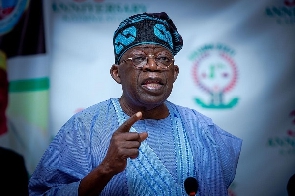A Nigerian court ruling on Thursday cemented Nigerian President Bola Ahmed Tinubu’s election victory, ending a hotly contested and drawn-out election trial that put Africa’s largest democracy on the threshold of a constitutional crisis.
Tinubu had been declared winner of February’s vote by the country’s Independent National Electoral Commission (INEC), despite international observers saying the process was marred by irregularities.
Opposition candidates, led by Atiku Abubakar of the People’s Democratic Party (PDP) who was runner-up in the election, challenged the results on the grounds of electoral malpractice and ineligibility. In September, the Presidential Elections Petitions Tribunal (PEPT) dismissed the opposition’s case, prompting Abubakar’s team to immediately file an appeal at Nigeria’s apex court, the final recourse on electoral issues.
In Thursday’s ruling, judges of the Supreme Court shut down that appeal and upheld the lower court’s decision. Presiding judge John Okoro said the court could not accept new evidence that Abubakar’s team had doggedly obtained in a widely followed deposition of a Chicago State University official in a US court earlier this month.
The evidence, analysts said, cast doubts on Tinubu’s educational qualifications and Abubakar’s lawyers had sought to use it as proof that the president presented a forged certificate to INEC, a crime under Nigerian law if established.
But, experts said, it was a card pulled too late.
“You can’t bring fresh evidence in a case that has already been decided at first instance,” Martin Obono, a lawyer and political commentator told Al Jazeera, referring to the initial decision of the lower election tribunal. The opposition, Obono added, was also unable to strongly prove that Tinubu had lost the elections.
“You have to prove that you won and either your votes did not count, or there was overvoting somewhere,” Obono said. “That is the only way that elections have been upturned in Nigeria, not through these technical issues.”
Thursday’s decision was not unexpected. Nigeria’s Supreme Court has never overturned a presidential election result in the country’s six-decade history. But with thousands of Nigerians avidly following the case of President Tinubu’s missing credentials, enthralled by the drama it invoked, this case appeared close to being a first.
Mystery certificate
President Tinubu’s political career has long been mired in controversy. Inconsistencies in his credentials were first spotted after he became governor of Lagos in 1999. In a Supreme Court hearing in 2002, Tinubu’s team blamed the discrepancies on a clerical error and invoked his immunity as governor from prosecution.
Following his exit from the governor’s office in 2007, the noise died down while his political standing blossomed. But claims about Tinubu’s eligibility resurfaced last year as he announced that he would run for president.
Some allege that he has adopted someone else’s identity. Numerous allegations of corruption during and after his two-term governorship, as well as questions around the true source of his wealth, which some tie to narcotics, have also been raised.
His opponents earlier argued that Tinubu was ineligible to run in the February election because he had been indicted for drug trafficking while living in Chicago. US government statements confirm that Tinubu forfeited $460,000 in 1993 over links to a drug trafficking syndicate, but he was not indicted or convicted.
It was not originally part of the appeal, but following the election tribunal’s decision last month to discard the opposition’s malpractice claims, Abubakar, a former vice president, filed a lawsuit in Chicago to get the Chicago State University (CSU), where Tinubu claimed to have received a degree, to release original copies of Tinubu’s diploma and other documents from its archive.
CSU registrar Caleb Westberg in a hearing confirmed that Tinubu attended the institution between 1977 and 1979. However, Westberg said the school could not authenticate or divorce the certificate Tinubu submitted to INEC.
Tinubu did not need a university degree to be president. Under Nigerian law, the minimum required educational qualification for a presidential candidate is a school leaving certificate, the equivalent of a high school diploma. But President Tinubu never submitted one.
What now?
Under Nigerian law, the Supreme Court’s decision is final and cannot be overturned.
Hours after the ruling, President Tinubu hailed the decision as a “victory,” saying it “strengthen[s] my resolve to do more.”
But opposition parties are unsurprisingly not happy. Supporters of Peter Obi – the Labour Party (LP) candidate who had garnered a huge following among Nigeria’s young, but who came third after the vote counts in February – had accused the top court of not taking enough time to come up with a judgement date, even before the decision was announced.
“Bola Ahmed Tinubu is not my president,” one supporter posted on X, formerly known as Twitter, after the ruling.
Abubakar’s PDP in a statement late Thursday said it was “disappointed and gravely concerned with the reasoning of the Supreme Court.” Kalu Kalu, a lawyer in Abubakar’s camp, told Al Jazeera earlier that his team would not take further action.
“The Supreme Court is the highest court of law in Nigeria and its judgement is final,” Kalu had said. “Anyone not satisfied with it will live with it.”
Neither Abubakar nor Obi has personally reacted to the court’s judgement. Both opposition candidates are likely to challenge President Tinubu again in the next elections due in 2027, Obono said.
With the election case decidedly put to rest, President Tinubu faces another, ever-growing challenge: a worsening economic outlook.
Since he took office in May, the naira has dipped to historic levels, despite biting economic reforms Tinubu announced on the first day of his presidency.
Fuel prices skyrocketed after a subsidy was removed, despite Nigeria being a major oil producer. Food prices too, have soared, reaching a peak not seen since 2007, according to the World Bank.
Click to view details



Africa News of Monday, 30 October 2023
Source: aljazeera.com

















